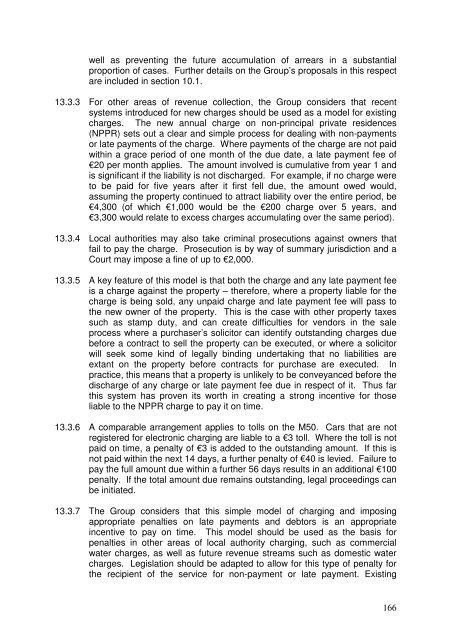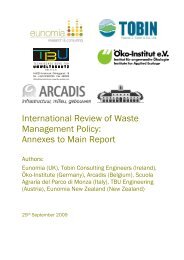Report of the Local Government Efficiency Review Group
Report of the Local Government Efficiency Review Group
Report of the Local Government Efficiency Review Group
You also want an ePaper? Increase the reach of your titles
YUMPU automatically turns print PDFs into web optimized ePapers that Google loves.
well as preventing <strong>the</strong> future accumulation <strong>of</strong> arrears in a substantial<br />
proportion <strong>of</strong> cases. Fur<strong>the</strong>r details on <strong>the</strong> <strong>Group</strong>’s proposals in this respect<br />
are included in section 10.1.<br />
13.3.3 For o<strong>the</strong>r areas <strong>of</strong> revenue collection, <strong>the</strong> <strong>Group</strong> considers that recent<br />
systems introduced for new charges should be used as a model for existing<br />
charges. The new annual charge on non-principal private residences<br />
(NPPR) sets out a clear and simple process for dealing with non-payments<br />
or late payments <strong>of</strong> <strong>the</strong> charge. Where payments <strong>of</strong> <strong>the</strong> charge are not paid<br />
within a grace period <strong>of</strong> one month <strong>of</strong> <strong>the</strong> due date, a late payment fee <strong>of</strong><br />
€20 per month applies. The amount involved is cumulative from year 1 and<br />
is significant if <strong>the</strong> liability is not discharged. For example, if no charge were<br />
to be paid for five years after it first fell due, <strong>the</strong> amount owed would,<br />
assuming <strong>the</strong> property continued to attract liability over <strong>the</strong> entire period, be<br />
€4,300 (<strong>of</strong> which €1,000 would be <strong>the</strong> €200 charge over 5 years, and<br />
€3,300 would relate to excess charges accumulating over <strong>the</strong> same period).<br />
13.3.4 <strong>Local</strong> authorities may also take criminal prosecutions against owners that<br />
fail to pay <strong>the</strong> charge. Prosecution is by way <strong>of</strong> summary jurisdiction and a<br />
Court may impose a fine <strong>of</strong> up to €2,000.<br />
13.3.5 A key feature <strong>of</strong> this model is that both <strong>the</strong> charge and any late payment fee<br />
is a charge against <strong>the</strong> property – <strong>the</strong>refore, where a property liable for <strong>the</strong><br />
charge is being sold, any unpaid charge and late payment fee will pass to<br />
<strong>the</strong> new owner <strong>of</strong> <strong>the</strong> property. This is <strong>the</strong> case with o<strong>the</strong>r property taxes<br />
such as stamp duty, and can create difficulties for vendors in <strong>the</strong> sale<br />
process where a purchaser’s solicitor can identify outstanding charges due<br />
before a contract to sell <strong>the</strong> property can be executed, or where a solicitor<br />
will seek some kind <strong>of</strong> legally binding undertaking that no liabilities are<br />
extant on <strong>the</strong> property before contracts for purchase are executed. In<br />
practice, this means that a property is unlikely to be conveyanced before <strong>the</strong><br />
discharge <strong>of</strong> any charge or late payment fee due in respect <strong>of</strong> it. Thus far<br />
this system has proven its worth in creating a strong incentive for those<br />
liable to <strong>the</strong> NPPR charge to pay it on time.<br />
13.3.6 A comparable arrangement applies to tolls on <strong>the</strong> M50. Cars that are not<br />
registered for electronic charging are liable to a €3 toll. Where <strong>the</strong> toll is not<br />
paid on time, a penalty <strong>of</strong> €3 is added to <strong>the</strong> outstanding amount. If this is<br />
not paid within <strong>the</strong> next 14 days, a fur<strong>the</strong>r penalty <strong>of</strong> €40 is levied. Failure to<br />
pay <strong>the</strong> full amount due within a fur<strong>the</strong>r 56 days results in an additional €100<br />
penalty. If <strong>the</strong> total amount due remains outstanding, legal proceedings can<br />
be initiated.<br />
13.3.7 The <strong>Group</strong> considers that this simple model <strong>of</strong> charging and imposing<br />
appropriate penalties on late payments and debtors is an appropriate<br />
incentive to pay on time. This model should be used as <strong>the</strong> basis for<br />
penalties in o<strong>the</strong>r areas <strong>of</strong> local authority charging, such as commercial<br />
water charges, as well as future revenue streams such as domestic water<br />
charges. Legislation should be adapted to allow for this type <strong>of</strong> penalty for<br />
<strong>the</strong> recipient <strong>of</strong> <strong>the</strong> service for non-payment or late payment. Existing<br />
166
















